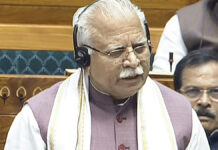DOGRA HERALD BUREAU
JAMMU, Jan 17
The Jammu and Kashmir Government on Wednesday constituted a Fact Finding Committee with Director General of Police as its convenor to enquire into the “irregularities” committed in supply and installation of Power Fencing System across 10 Jails of Jammu & Kashmir.
Besides DGP as convenor, the members of the committee include Commissioner/Secretary to the Government, General Administration Department and FA/CAO, Home Department, according to a government order “The committee shall examine all aspects of the case, including actions taken by the officers/officials of Prisons Department at the time of issuing the Supply Order, and the process followed while allotting CMC/AMC Contract, without adhering to the terms and conditions of tender for the project,” the order reads.
The committee has been also tasked with fixing the responsibility for acts of omission and commission on part of the officers and officials of the Prisons Organization. “The committee shall furnish its report to the Government along-with recommendations, within a period of 30 days.”
Section 197 CrPC Does Not Extend Protective Cover To Every Omission Of Public Servant: SC
New Delhi, Jan 17: The Supreme Court said on Wednesday Section 197 of the Code of Criminal Procedure (CrPC), which deals with prosecution of judges and public servants, does not extend its protective cover to every act or omission of a public servant while in service.
A bench of Justices Abhay S Oka and Ujjal Bhuyan said the shield is restricted to only those acts or omissions which are done by public servants in discharge of their official duties.
The bench referred to sub-section (1) of section 197 which says when any person who is or was a judge or magistrate or a public servant not removable from his office save by or with the sanction of the government is accused of any offence alleged to have been committed by him while acting or purporting to act in the discharge of his official duty, no court shall take cognisance of such offence except with the previous sanction of the competent authority.
The apex court set aside an order of the Karnataka High Court which had quashed a criminal complaint and a charge sheet filed against a government official.
It said the ambit, scope and effect of section 197 of CrPC has received considerable attention of the top court.
“It is not necessary to advert to and dilate on all such decisions. Suffice it to say that the object of such sanction for prosecution is to protect a public servant discharging official duties and functions from undue harassment by initiation of frivolous criminal proceedings,” the bench said.
The bench, while referring to some previous verdicts of the apex court, noted, “Thus, this court has been consistent in holding that section 197 CrPC does not extend its protective cover to every act or omission of a public servant while in service. It is restricted to only those acts or omissions which are done by public servants in the discharge of official duties.” It delivered its verdict on an appeal filed by the complainant challenging the November 2020 order of the high court which had held that since sanction to prosecute the accused, who was working as a village accountant, was denied, his prosecution for criminal offences cannot continue.
The high court had quashed the complaint as well as the charge sheet filed in the case.
The complainant had lodged an FIR in December 2016 alleging that the public servant, along with others, was creating property documents in the name of people who had died despite knowing that those were forged for illegal gain. The police had later filed a charge sheet against three people.
“The question whether respondent no.2 (accused) was involved in fabricating official documents by misusing his official position as a public servant is a matter of trial. Certainly, a view can be taken that manufacturing of such documents or fabrication of records cannot be a part of the official duty of a public servant,” the bench said.
While setting aside the order, the apex court said the high court had erred in quashing the complaint as well as the charge sheet in its entirety.
The high court had passed the order on a plea by the public servant seeking quashing of the complaint and the charge sheet. It had noted that as per the prosecution, the offences he was accused of were committed while discharging his duties as a public servant.

























